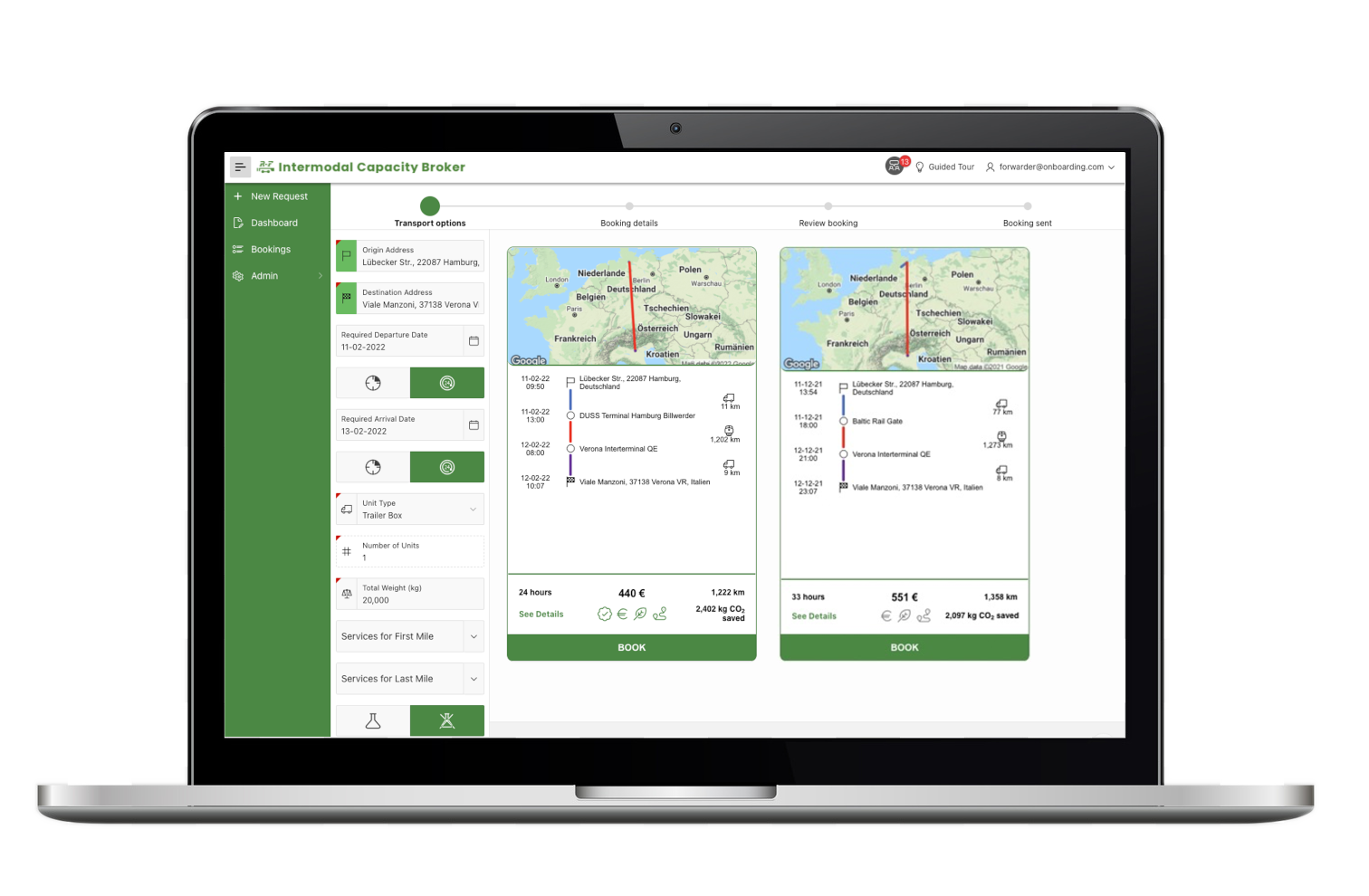Extension of the truck toll to 3.5 tons.
Why intermodal traffic will be required in the future.
Frankfurt, December 20, 2022
The prices for transport companies are increasing further. From 2024, the toll includes a CO₂-tax and already applies to vehicles with a permissible total weight of over 3.5 tons. Simultaneously, the truck traffic on German highways is increasing steadily. Are intermodal traffic concepts the future?
In the matter of the truck toll controversy the German government has come to a conclusion: The way for the truck toll change law is free, informed the coalition faction, the reform should come to operation from January 1st, 2024. An extension of the truck toll to vehicles above 3.5 tons and a CO₂-toll is agreed upon. Until now the truck toll just applied to vehicles weighing 7.5 tons and above.
The proposed law of the Ministry of Transport will be accepted unchanged with a change in the toll rates from 2023. As a result of the toll increase, the Federal Government expects average revenue of 8.3 billion euros per year. In comparison, 7.64 billion euros were collected in the previous year. In particular, the toll for trucks with low emission classes will increase to up to 10 cents per kilometre. For vehicles with emission class 6, which represent 90% on German roads, the increase is between 0.7 and 1.9 cents per kilometre. The plan is that the new truck toll will fund the construction of new streets as well as the refurbishment and expansion of railways and waterways.
Increase in the number of toll trucks by 0.7 percent
The truck toll has been established in 2005 on German highways and in the meantime it has been implemented also on all federal roads. It provides earnings in billions of euros. Yet, the truck traffic on German highways in October has increased. The mileage of toll paying trucks with at least four axles increased calendarly and seasonally adjusted by 0.7 percent in the last month compared to the month before. Compared to the year before, it remained unchanged as reported by the Federal Statistical Office.
The goal is making truck traffic carbon neutral to achieve the climate goals. Since there are no competitive battery or hydrogen powered trucks until today, the manufacturers urge to tax diesel powered engines.
“Truck manufacturers like MAN need clarity, so that their battery powered vehicles find some sales”, said the correspondent of the Grünen, Matthias Gastel, to the Handelsblatt. He demands “clear hints, where the journey goes” from the new laws.
Also, Chairman of Daimler-Truck Martin Daum just stated recently, that battery powered trucks will be noticeably more expensive, and it is not possible to subsidize them. “That’s why you would have to make what you don’t want more expensive, for example through a CO₂-based toll. So that in the long run it becomes cheaper to drive electric”, he says.
“We would prefer a postponement of the toll rise”
Facing high gas prices the freight-forwarding industry spoke for postponing the planned rise in the truck toll in January by a few months. “It is nearly impossible to charge the current toll increase to the shipping industry”, told Dirk Engelhardt, Spokesman of the Board of the Federal Association of Road Haulage, Logistics and Disposal to the „Augsburger Allgemeinen“. “That is the reason why we would prefer a postponement of the toll rise by a few months”, he said.
Especially forwarders are affected, who have largely converted their fleet to LNG vehicles. “LNG has become far more expensive than diesel, but most of the clients are just willing to pay freight orders on diesel basis, said Engelhardt.
The Spokesman also pointed out, that the higher truck toll should also affect the prices for consumers: “When the eco-toll is implemented, it has to be clear: The client – and with that sooner or later the consumer – pays.”
Intermodal traffic: A way to counteract the toll increase?
Intermodal traffic means the multiple transport chain with two or more modes of transportation carry a load without changing the container. The most common use is the combination of truck, train, plane and ship. In addition to cost optimization, savings in capacity with a higher payload at the same time and environmental protection are among the greatest advantages. Roads and highways are hereby less frequented, and tolls are saved.
Transport companies who want to benefit from the advantages of intermodal transport will find a simple solution with Rail-Flow’s Intermodal Capacity Broker (ICB) tool. The ICB is a neutral platform that gives rail operators, forwarders and transport companies a transparent overview of free capacities in the European market. This gives providers and booking forwarders the opportunity to book intermodal transport directly and to work efficiently with others. With just a few clicks, intermodal newcomers can also gain access and book transport directly via the platform.
Be prepared for the future and book your intermodal transports just within a few klicks.

In combination with the accounting system from JITpay™, not only time but also costs can be greatly reduced. By integrating JITpay™ into the Intermodal Capacity Broker, transport companies can assign the claims arising from the order directly to JITpay™ and receive payment for the order within 24 – 48 hours after the service has been fulfilled. JITpay™ takes over the dunning and receivables management as well as the entire default risk for the transport company. At the same time, the contractor remains liquid and can accept new orders. Order management works completely digitally via the JITpay™ portal. Booking forwarders also benefit from the advantages of digitized and automated billing in cooperation with JITpay™.
About JITpay™:
The payment service provider JITpay™, which specializes in the logistics industry, was founded in 2016. The core product is its own, fully digital, BAFIN-regulated factoring company. In an ecosystem, JITpay™ offers complementary services together with partners and combines them with the core product factoring. In August 2022, JITpay™ had around 100 employees and more than 1500 customers across Europe rely on JITpay™’s services. Target customers are small and medium-sized transport companies in Europe. The company, which also has locations in Basel/Zurich (Switzerland), Wroclaw (Poland) and Bucharest (Romania), acts as a trusted partner for logistics companies: It takes over and digitizes the complete service billing between client and contractor and combines this with a specially developed factoring program, which enables the contractor to be paid immediately and offers flexible payment terms for the client. JITpay™ stands for “Just-In-Time payment!”.
Source: JITpay™
Authors: Dirk Mewis and Lakisha Adu


